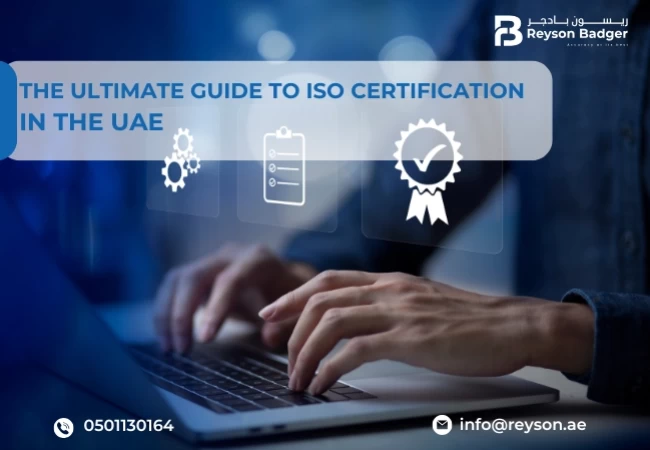

ISO certification in the UAE is an essential step for business organizations, ensuring full adherence to international standards while promoting improvement in quality, credibility, and operational efficiency. It's proof of excellence that increases trust with customers and stakeholders and opens opportunities in global markets. However, this process, though somewhat structured, could be complex to navigate without proper guidance. This guide will include the requirements, application steps, and tips for ensuring a seamless certification journey. Ultimately, you will have a clear roadmap for achieving ISO certification and taking your business to greater heights.
ISO standards are internationally accepted guidelines that allow organizations to be sure that their products, services, and processes meet the criteria of consistent quality, safety, and efficiency. In the UAE, business organizations must achieve credibility, satisfy customers, and enter global markets by adhering to these standards. The implementation of these standards is handled by the Ministry of Industry and Advanced Technology (MoIAT), which provides national regulations and guidelines for compliance.
ISO certification in the UAE means a business has been checked and meets international standards set by the International Organization for Standardization (ISO). This shows customers and partners that the company follows best practices in quality, environment, and security. Getting ISO certification can help improve the company’s reputation, make operations smoother, and create new business opportunities.
ISO certifications in the UAE are internationally recognized standards that help businesses improve their operations and meet customer expectations. Here are some of the most common ISO certifications:
These certifications help businesses in the UAE improve efficiency, ensure compliance with international standards, and improve their overall performance in various areas such as quality, safety, environment, and social responsibility.
In the UAE's competitive market, a strong reputation is crucial for gaining customer trust, and loyalty, and standing out from the competition. It also helps attract international clients and investors, boosting long-term success certification brings key benefits that boost a business's reputation, including:
Obtaining ISO certification in the UAE is a straightforward process that helps ensure your business meets international standards. Here's a simple guide to the steps involved:
Learn about the ISO standard you need, like ISO 9001 for quality management or ISO 14001 for environmental management.
Check your current practices and compare them with the ISO requirements to find areas that need improvement.
Create policies and processes that meet ISO standards. Make sure your team is trained and knows their roles.
Regularly check if your system is working well and meeting the ISO standards.
Have your top management review the system and make improvements where necessary.
Select an accredited certification body in the UAE to perform the audit.
The certification body will audit your business to check if it meets the ISO standard.
If the audit finds any problems, take corrective action to fix them.
Once everything is in order, the certification body will issue your ISO certificate.
Continue reviewing and improving your system to ensure it stays up-to-date and meets the standards.
This process helps your business achieve better quality, efficiency, and compliance with international standards.
Getting ISO certification in Dubai UAE normally takes about 3 to 12 months depending on the size of your business and how prepared you are. The price of ISO certification differs. For instance, obtaining ISO 9001 certification in the UAE may range from AED 3,000 to AED 25,000. This includes training, documentation, audits, and the costs imposed by the certification authority. Remember that selecting a reputable, accredited certification organization guarantees your certification is acknowledged and reliable. Investing in ISO certification can bring long-term benefits such as better processes, improved customer satisfaction, and access to new business opportunities.
In conclusion, obtaining the Best ISO certification in the UAE is an essential step for businesses looking to improve their processes, meet global standards, and build stronger customer trust. By understanding the required ISO standard, developing the necessary systems, and undergoing a thorough audit, businesses can achieve certification and prove their commitment to quality and compliance. With the right preparation and resources, businesses can successfully navigate the certification process and enjoy the long-term benefits that come with maintaining ISO standards, such as better credibility and a stronger market position. For guidance throughout the process, Reyson Badger offers expert consultation and support in obtaining the best ISO certification in UAE.
Can ISO certification be transferred to another company?
No, ISO certification cannot be transferred to another company. It is specific to the organization that achieved it, as it reflects their compliance with ISO standards. A new company must undergo its own certification process.
How does ISO certification work?
ISO certification involves implementing the required standards, conducting an internal audit, and hiring a certification body for an external audit. If compliant, the organization receives certification, valid for a set period, with regular surveillance audits to maintain it.
Where to get iso certification?
ISO certification can be obtained through accredited certification bodies. In the UAE, consult local providers like Certifications.ae, Shuraa, or SIS Certifications. Globally, choose bodies accredited by the International Accreditation Forum (IAF) for reliable certification.
Which ISO certification is best?
The best ISO certification depends on your industry and goals. ISO 9001 (Quality Management) is widely applicable, while ISO 14001 (Environmental Management) suits sustainability-focused businesses. Choose based on your operational needs and compliance requirements.
Which ISO certification is best for educational institutions?
For educational institutions, ISO 21001 (Educational Organizations Management System) is the best. It focuses on improving educational processes, enhancing learner satisfaction, and ensuring effective management, aligning with the unique needs of educational providers.
Which ISO certification is required for the IT company?
For IT companies, ISO/IEC 27001 (Information Security Management) is essential for data security. Additionally, ISO 9001 (Quality Management) ensures operational efficiency, and ISO 20000-1 (IT Service Management) is ideal for IT service providers.
Who provides ISO certification?
ISO certification is provided by accredited certification bodies, such as Certifications.ae, SIS Certifications, or Shuraa in the UAE. Globally, choose bodies accredited by the International Accreditation Forum (IAF) for reliable and recognized certification services.